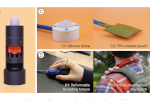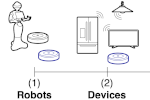Applying for a PhD Position
Open Positions
China Scholarship Council: University of Bath PhD programme - open to outstanding candidates from China in any area of research. Deadline: November 30, 2025.
David Parkin Scholarship - open to outstanding candidates from the Americas: North, Central, South or Caribbean, for research in any area. Deadline: November 30, 2025.
Fully-funded PhD Studentship in Novel Haptic Devices for Mobile Multi-Robot Control. Deadline: December 18, 2025.
Introduction
I am always on the lookout for exceptional PhD candidates. The nature of my research means students in my lab typically come with strong technical backgrounds (e.g. Computer Science, Mechanical Engineering, Electrical Engineering, Robotics). However, this not a requirement, provided you can demonstrate how your skillset or background fits into our work on haptics, shape-changing interfaces, fabrication, or data physicalization.
Please do get in touch if you're enthusiastic and passionate about the research in my lab and are interested in applying for a PhD position. Unfortunately I get too many inquiries to be able to be able to reply to them all, but here are some top tips for engaging in the process:
- Before contacting me, ensure you meet the University of Bath entry requirements for the PhD in Computer Science.
- Make sure you're familiar with my lab's work and how that aligns with your interests—you can browse current project ideas below, or you might have your own that aligns with our work that you wish to propose.
- If you want some outstanding tips on how to write emails of introduction/interest to academics, read and apply Stevie Chancellor's advice on How to Email a Professor.
- When you email me, in addition to Stevie's tips, please be clear about your expectations around funding (see the PhD fees page for current rates—this is likely to be one of: (1) You're interested in an advertised position (it will be listed on this page if I have any); (2) You're interested in self-funding your PhD or; (3) You don't have funding (note that if I don't have positions advertised on this page, it's unlikely I have access to funding).
- Finally, all PhD Applications go though the University of Bath's PhD application process. I cannot make admissions outside of this process; so if you're serious, you'll have to apply.
PhD Topics
The below PhD topics provide an idea of my current areas of interest for supervising new PhD students. In all cases, the topics are just starting points and it is expected that they would be adapted according to your interests, experience, and expertise. I am open to projects in other areas, as long as there is strong alignment with my core interests.
Publications is an essential element of your PhD journey, My students publish their work at the leading venues for dissemination in Human-Computer Interaction including ACM CHI, ACM UIST, ACM ToCHI, and ACM SIGGRAPH. For robotics topics we also publish as ACM THRI, IEEE HRI, and ICRA and for Visualisation topics ACM ToG and IEEE VIS.
Haptic Touchscreens
This is an exciting opportunity to conduct blue-skies research into the next generation of display technology. You will design, prototype, and evaluate visual display surfaces that integrate one or more additional touch-based sensory feedback modalities, such as shape, texture, or temperature.
You will experiment with novel construction approaches to build such displays – these might include off-the-shelf components (Arduino, 3D printing) and/or methods, technologies, and tools from material science, soft-robotics, or mechatronics, depending on your background. With your prototypes, you will design user interaction techniques that capitalise on these new modalities, and evaluate the outcomes.
Expected background: some experience in physical computing, mechanical engineering, soft-robotics, or mechatronics required. Experience in HCI desirable, but not essential.
Relevant publications:
Honorable Mention Award
Novel Haptic Devices for Mobile Multi-Robot Control
Despite the continued rise of autonomy, human-in-the-loop control of mobile robots will continue to remain essential in the long term (e.g. to ensure safety, or to execute complex or sensitive tasks). Current approaches to control (typically joysticks) do not scale beyond a single robot, both due to the limited interaction capabilities and fundamental limits of the operator’s cognitive ability.
The overarching goal of this PhD project is to therefore design, build, and evaluate novel haptic interfaces that will facilitate more effective multi-robot control. We envision the outcomes to build on recent work in our lab (see References) and will likely take a multi-sensory approach, where haptics is combined with AR or VR or other sensory modalities. There is scope for the project to evolve based on the student’s interest, expertise, and experience.
Expected background: some experience in physical computing, mechanical engineering, soft-robotics, or mechatronics required. Experience in HCI desirable, but not essential.
Relevant publications:
Honorable Mention Award
Data Physicalization
Data Physicalization is the physical analogy of Data Visualization---physicalizations convey data using an artefact’s geometry or material properties. Data Physicalizations range from static 3D-printed artefacts to fully interactive dynamic bar charts that can update their physical form as a user interacts (see http://dataphys.org/list/ for a list of examples). From a scientific perspective, this is a relatively new field of study that brings together researchers across Human-Computer Interaction, Computer Science, Design, Engineering, and Information Visualization.
This technologically exciting project aims to understand the role, configuration, user perception, and impact of physical movement and animation in dynamic and interactive data physicalizations. You will design and construct prototype physicalizations that explore the design space of dynamic data physicalizations and human-data interaction. You will conduct systematic studies to understand the perceptual, subjective, and objective impact of physical movement on the user's experience and ability to understand and interpret the data. Your work will lead to guidelines that will lay the foundation for the design of future dynamic data physicalizations.
Expected background: experience in HCI or Visualisation is required, some experience in physical computing is desirable.
Relevant publications:






